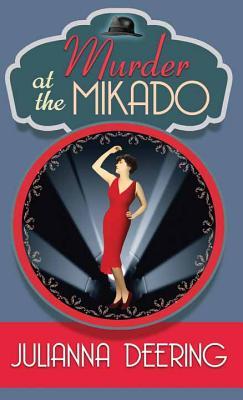Murder at the Mikado, the third novel in the Drew Farthering mystery series, has not transformed into the series-saver that I’d hoped. I thought the first one was okay (see my Rules of Murder review), and I didn’t review the second one for you all as I didn’t think it was worth writing about (to sum up, plot was weird, Madeline and Drew are weird, etc.). This one has not improved my opinion of the series, so, unfortunately, this is where I will stop reading.
In this novel, Drew has employed a new manager for his company, who happens to be married to one of his ex-girlfriends, Fleur. Fleur is dramatic in the literal and figurative sense, as she used to be an actress before her marriage. However, she’s now in trouble, as she’s become the chief suspect in the murder of one of the leading actors in her old company. She asks for Drew’s help in clearing her name, which causes tensions between him and Madeline, his fiancee. She reluctantly assists him in his investigation, but, as more people end up dead and a solution seems far away, it looks as if Fleur will be an issue indefinitely.
I don’t have a single big issue with this series; it’s more of a combination of small issues that add up to a so-so feeling. Deering writes this series with an almost Agatha Christie-en vibe; the writing style is similar, as is the era that the books were set in. The style is such that the book revolves around the mystery and the routines of life are ignored, much as in a Christie novel. However, that is where the similarities stop.
Drew Farthering is a carefree, 24-year old man who reads a lot of detective stories and “has a go” at solving crimes that happen in his village. He jaunts along with his fiancee and best friend, who both appear to have as much of a lark as he does solving the mysteries. The “just for fun” bit of Drew’s detecting is the first thing that really annoys me about this series. To readers (me!), it’s entertaining to read about someone solving a seemingly impossible murder mystery. To Drew, it also appears to be entertaining – and I don’t think it should be.
He and his friends completely ignore the seriousness of the situation and romp about finding clues and puzzling things out as if the case is a murder mystery dinner party. I wouldn’t find this as disturbing if it was acknowledged anywhere that he did feel something about people dying around him, but he doesn’t seem to. Given the amount of time he spends waxing on about his fiancee, you’d think he could spare some emotion for the brutally murdered people in his path.
Second, I have a terrible issue with Drew and Madeline as a couple. Sure, they met under tragic circumstances, which helped them to develop feelings quickly, but they’re too perfect. He’s all charm and impeccable manners; she’s the petite American beauty who swept him off of his feet. It’s not an unreasonable match, but there’s absolutely no substance to their personalities. He’s supposed to be fairly tortured (I guess) because he doesn’t know who his real mother is but, again, this never appears in his thought process at all. It’s all Madeline, Madeline, Madeline. Madeline is just this ethereal image that us readers have, who seems to have no troubles other than being unreasonably insecure at times. They’re just not realistic characters, and if we readers have to sit through how much they love each other again and again (and are to believe in that love!), I think we should be afforded some substance with all of this fluff.
Lastly, the plots in this series are just fairly odd. They’re well-written enough to keep readers guessing until the end, which is what kept me engaged with the stories (again, even in this book where fiance-meets-ex, and no drama or emotional realism to be seen). But they are strange. I didn’t totally understand the conclusion to this novel; I felt it was missing a key piece, the conclusion to the second novel was unusual and strange, and the conclusion to the first was the only one that seemed realistic to me.
So, feel free to read these novels yourselves and tell me what you think. I don’t mean to totally trash the books, but there are some areas for me that leave a lot to be desired. Deering takes a good stab at a Christie-esque feel, but I’m not sure the romance aspect pieces together well with her plots. The mystery should come first, with the romance slipping in unobtrusively, and that has definitely not happened in these books.
